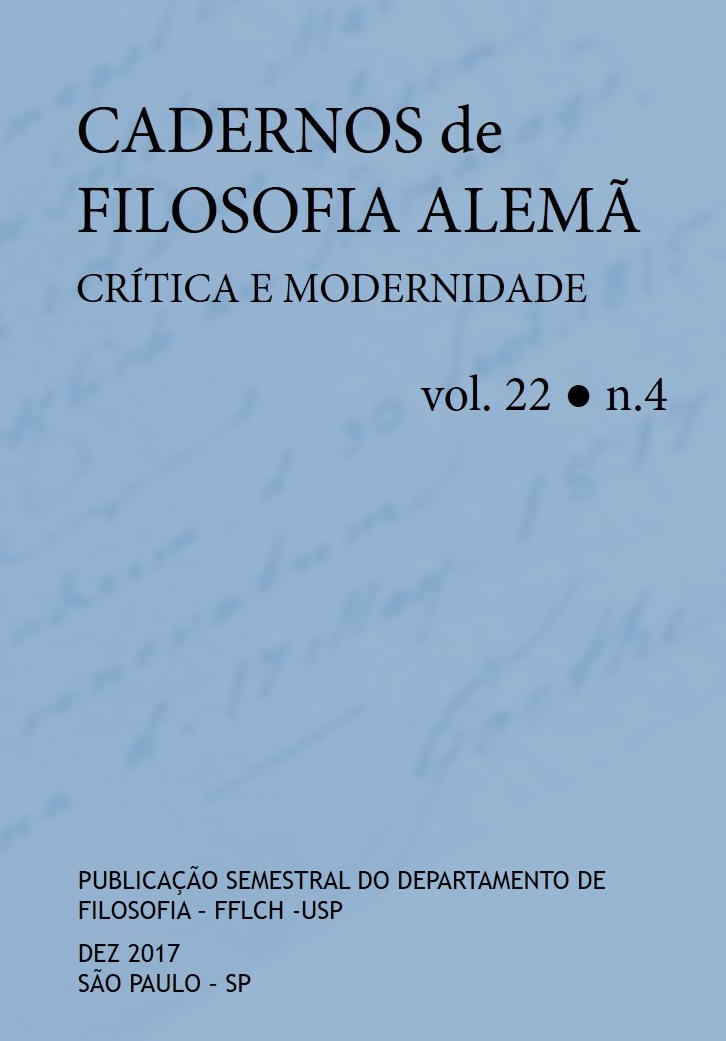Towards a political critique of capitalism – beyond Rahel Jaeggi
DOI:
https://doi.org/10.11606/issn.2318-9800.v22i4p63-83Keywords:
critique of capitalism, critical theory, Rahel Jaeggi, political critique, economic heteronomyAbstract
In this paper, I underline the renewal of the critique of capitalism by contemporary critical theorists Albena Azmanova, Nancy Fraser and Rahel Jaeggi (1). Then, I highlight that what distinguishes Rahel Jaeggi is a metatheoretical elaboration aimed at ethically deepening the functional and moral dimensions of the critique of capitalism (2). Finally, I maintain that, Rahel Jaeggi’s achievements notwithstanding, politically furthering the critique of capitalism is necessary to show how capitalism is, rather than a purely economic, economically ineluctable order, a political-economic arrangement that both casts a spell on the capitalist relations of production and naturalizes economic heteronomy (3).
Downloads
References
Adorno, T. W. (2003). “Late capitalism or industrial society? The fundamental question of the present structure of society”. Translation by Rodney Livingstone. In: Tiedemann, R. (ed.). Can one live after Auschwitz? A philosophical reader. Stanford: Stanford University Press.
Azmanova, A. (2014). Crisis? Capitalism is doing very well. How is Critical Theory? Constellations, 21(3), pp.351-365.
Anderson, J. (2011). “Situating Axel Honneth in the Frankfurt School tradition”. In: Petherbridge, D. (ed.). Axel Honneth: critical essays. With a reply by Axel Honneth. Leinde, Boston: Brill.
Bressiani, N. (2016). Uma nova geração da teoria crítica. Discurso, 46(1), pp.231-249.
Brick, B., & Postone, M. (1976). Introduction. Friedrich Pollock and the “primacy of the political”: a critical reexamination. International Journal of Politics, 6(3), pp.3-28.
Campello, F. (2014). O Hegel de Honneth. Pólemos, 3(6), pp.97-123.
Fraser, N. (2016). Contradictions of capital and care. New Left Review, 100, pp.99-117.
Habermas, J. (2013) Teoria e práxis: estudos de filosofia social. Tradução de Rúrion Melo. São Paulo: Editora UNESP.
____________. (2016a). Teoria do agir comunicativo. v.1: Racionalidade da ação e racionalização social. Tradução de Paulo Astor Soethe. São Paulo: WMF Martins Fontes.
____________. (2016b). Teoria do agir comunicativo. v.2: Sobre a crítica da razão funcionalista. Tradução de Flávio Beno Siebeneichler. São Paulo: WMF Martins Fontes.
Hartmann, M., & Honneth, A. (2006). Paradoxes of capitalism. Translation by James Ingram. Constellations, 13(1), pp.41-58.
Honneth, A. (1998). Democracy as reflexive cooperation: John Dewey and the theory of democracy today. Political Theory, 26(6), pp.763-783.
____________. (2001). Recognition or redistribution? Changing perspectives on the moral order of society. Theory, Culture & Society, 18(2-3), pp.43-55.
____________. (2007). “Recognition as ideology”. In: Brink, B. v. d., & Owen, D. (eds.). Recognition and power: Axel Honneth and the tradition of critical social theory. Cambridge: Cambridge University Press.
____________. (2015). O direito da liberdade. Tradução de Saulo Krieger. São Paulo: Martins Fontes.
Horkheimer, M. (2003). “Teoría tradicional y teoría crítica”. In: Teoría Crítica. Traducción de Edgardo Albizu y Carlos Luis. Buenos Aires: Amorrortu.
Jaeggi, R. (1999). Der Markt und sein Preis. Deutsche Zeitscjrift für Philosophie, 47(6), pp.987-1004.
____________. (2009). “Rethinking ideology”. In: De Bruin, B., & Zurn, C. (eds.). New waves in political philosophy. Hampshire: Palgrave Macmillan.
____________. (2014). Alienation. Translation by Frederick Neuhouser and Alan E. Smith. New York: Columbia University Press.
____________. (2016). What (if anything) is wrong with capitalism? Dysfunctionality, exploitation and alienation: three approaches to the critique of capitalism. The Southern Journal of Philosophy, 54, Spindel Supplement: Exploitation, pp.44-65.
____________. (2017). “Crisis, contradiction, and the task of a critical theory”. In: Bargu, B., & Bottici, C. (eds.). Feminism, capitalism, and critique: essays in honour of Nancy Fraser. Basingstoke: Palgrave Macmillan.
Kellner, D. (1984). Herbert Marcuse and the crisis of Marxism. Basingstoke: Macmillan.
Marcuse, H. (2015). O homem unidimensional: estudos da ideologia da sociedade industrial avançada. Tradução de Robespierre de Oliveira, Deborah Christina Antunes & Rafael Cordeiro Silva. São Paulo: EDIPRO.
Marramao, G. (1975). Political economy and Critical Theory. Translation by Ray Morrow. Telos, 24, pp.56-80.
Marx, K. (2014). O capital: crítica da economia política. Livro I: O processo de produção do capital. Tradução de Rubens Enderle. São Paulo: Boitempo.
Melo, R. (2013). Marx e Habermas: teoria crítica e os sentidos da emancipação. São Paulo: Saraiva.
Nobre, M. (2013). “Marx: teoria do valor-trabalho e fetichismo”. In: Curso livre de teoria crítica. 3ª ed. Campinas: Papirus.
____________. (2012). Teoria Crítica: uma nova geração. Novos Estudos, 93, pp.23-27.
Polanyi, K. (2001). The great transformation: the political and economic origins of our time. 2. ed. Boston: Beacon Press.
Pollock, F. (1990). “State capitalism: its possibilities and limitations”. In: Arato, A., & Gebhardt, E. (eds.). The essential Frankfurt School reader. New York: Continuum.
Streeck, W. (2012). As crises do capitalismo democrático. Tradução de Alexandre Morales. Novos Estudos, 92, pp.35-56.
Downloads
Published
Issue
Section
License
Information and conceptions on the texts are complete responsibility of the authors.
All the articles submitted before July 5th 2018 and those published after July 2021 are licensed under a CC BY-NC-ND license – except those published between the aforementioned dates, which are under the CC BY-NC-SA license. The permission for the translation of the material published under the license CC BY-NC-ND by third parts can be obtained with the consent of the author.
Open access policies - Diadorim
Rules applied before July 5th 2018:
Presenting a submission to our Editorial Board implies granting priority of publication for “Cadernos de filosofia alemã”, as well as transferring the copyright of texts (once published), which will be reproduced only with the manifest authorization of the editors. Authors keep the right to reuse the texts published in future editions of their work, without paying any fees to "Cadernos”. We will not grant the permission to re-edit or translate the texts for third parts without agreement of the author.


